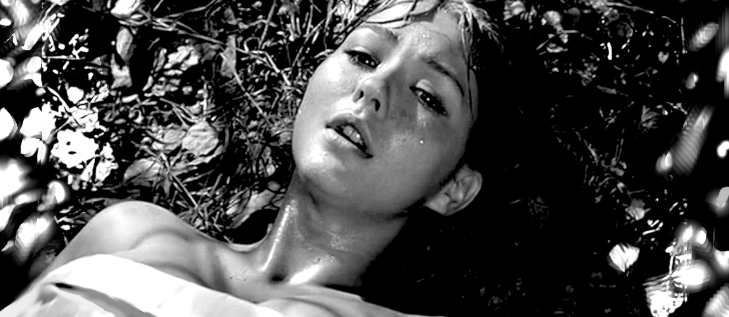Town without Pity
MGM’s in-house Blu-ray label is back with another worthy remaster: a Mirisch- supervised West German production that leads with a Gene Pitney smash hit single and gives Kirk Douglas another tough-guy attorney to play. A brutal gang rape in Germany puts four U.S. soldiers on trial; to save their lives, Kirk must demolish victim Christine Kaufman on the witness stand, with tragic results. E.G. Marshall and Barbara Rütting co-star; the slimeball defendants include Richard Jaeckel, Robert Blake, and Frank Sutton. Collectors take note: the Blu-ray disc is a correct widescreen, not 4×3 as noted by MGM and the websellers.

Town without Pity
Blu-ray
MGM
1961 / B&W / 1:85 widescreen / 103 105 min. / Street Date July 15, 2025 / Available from / 21.99
Starring: Kirk Douglas, Barbara Rütting, Christine Kaufmann, E.G. Marshall, Hans Nielsen, Ingrid van Bergen, Robert Blake, Richard Jaeckel, Frank Sutton, Karin Hardt, Gerhart Lippert, Alan Gifford, Eleonore von Hoogstraten, Elisabeth Neumann-Viertel, Stefan Schnabel.
Cinematography: Kurt Hasse
Art Director: Rolf Zehetbauer
Costume Design: Lilo Hagen
Film Editor: Werner Preuss
Composer: Dimitri Tiomkin
Screenplay by Silvia Reinhardt & Georg Hurdalek adapted by Jan Lustig from the novel The Verdict by Manfred Gregor
Produced by Gottfried Reinhardt, Eberhard Meichsner
Directed by Gottfried Reinhardt
 A couple of years after its launch, the Mirisch Corporation had cornered a fine lineup of Hollywood directors, racking up hits and award-winners from Billy Wilder, John Sturges, John Ford, Robert Wise, and William Wyler, all released by United Artists. Sliding in sideways was the German co-production Town without Pity, an openly exploitative drama with a controversial theme that was showing up regularly in Hollywood films, rape. In this UA offering, the ante was upped to gang rape.
A couple of years after its launch, the Mirisch Corporation had cornered a fine lineup of Hollywood directors, racking up hits and award-winners from Billy Wilder, John Sturges, John Ford, Robert Wise, and William Wyler, all released by United Artists. Sliding in sideways was the German co-production Town without Pity, an openly exploitative drama with a controversial theme that was showing up regularly in Hollywood films, rape. In this UA offering, the ante was upped to gang rape.
The topical context for Town without Pity was the build-up of American troops in Germany, toeing the line against the Soviets. The Berlin Wall didn’t officially close off East Berlin until August 13, 1961, months after the German version of Stadt ohne Mitleid made its debut. The picture is largely German-produced, yet it takes pains to be Pentagon- and State Department- friendly. The film’s tragic story has plenty of blame to pass around, but the U.S. Army brass comes off as decent and considerate. At least it does in the U.S. version we saw here. Our Town without Pity didn’t hit theaters until later, 3 months after the Berlin Wall went up.
Starting with a typical UA cold open — no logo and a pre-titles prologue — Town without Pity captures some of the flavor of German films around the 1960 mark, with brassy, lurid music heralding stories with crime and sex. Four bored GI’s with a day pass wander off their base and into the local town Neustadt, to the Florida Bar, a glorified diner and sex pickup spot catering to the Americans. The club’s prostitutes aren’t due for hours, so the men get drunk instead. Sgt. Snyder and Cpl. Scott (Frank Sutton & Richard Jaeckel) are irked and hostile, young Cpl. Larkin (Robert Blake) goes along with their bad example, and Pvt. Haines (Mal Sondock) is too stupid to know or care what he’s doing. Snyder shouts at Larkin as the juke box plays, loudly:

On the way back to camp they come across a young German couple making out by a brook, student Frank Borgmann (Gerhardt Lippert) and 16 year-old Karin Steinhof (Christine Kaufmann). Frustrated that Frank won’t have sex with her, Karin teases him from the other side of the brook. The spectacle serves as a green light for the servicemen, who seize her and knock Frank out cold.
A few hours later, the camp’s General Stafford (Alan Gifford) is rushing to prevent a local riot. He promises the mayor and Karin’s furious father (Hans Nielsen) that U.S. Army justice will be swift. Germany has no death penalty but the Army does, and both Herr Steinhof and U.S. prosecutor Col, Pakenham (E.G. Marshall) want all four men to die. To defend them arrives Major Steve Garrett, a hotshot convinced that they’re guilty but determined to save their lives. The only way he can do that is to destroy Karin in cross-examination and make her flee the witness stand … thereby putting the death penalty out of reach.
It’s an early run-through of a storyline now familiar from 10,000 movies and TV shows … Maj. Garrett’s only opening is to paint Karin as a slut whose actions ‘asked’ for an attack. That’s where the ‘town without pity’ business comes in — kids in “this uneasy age are like tigers in a cage.” Poor Karin becomes the focus of horrible gossip. Nobody comes to her defense. Her peers give hypocritical testimony criticizing her morals.
Although the brutal courtroom strategy was fairly new for the time, Town without Pity doesn’t escape its exploitative formula. All we see of the crime are Karin’s toes curling into the mud of the riverbank, plus the pathetic detail of Robert Blake’s ‘kid’ soldier showing remorse by leaving his shirt covering the naked Karin. The other three soldiers convey a total lack of contrition or empathy; by the standards of an occupying Army, the death penalty is not at all unreasonable. It should be painfully obvious that Karin is not responsible for provoking the men.
The finale is an all-too credible tragedy. Making things less pleasant is a screenplay that selectively assigns moral blame. This being an American movie under the Production Code, the Army brass comes off as fair and honorable. Nobody can do much about regrettable Bad Apples in the ranks, ist es nicht wahr? The American prosecution and defense are also above reproach, with each side fighting a good courtroom fight.
The four goons that raped Karin mostly sit dumb and stupid for the remainder of the show. Nobody blames the brass for allowing the existence of a Sin Street just outside the gates of the Army base. This American version instead chooses to blame the Germans. Neustadt is depicted as a miserable version of Peyton Place, with citizens that can’t wait to see Karin suffer.
Major Garrett interviews the Florida Bar’s prostitutes without calling them that by name. The mercenary Trude (Ingrid van Bergen) is happy that the case’s notoriety has made the local fräuleins wary of servicemen, leaving more business for her. Frank and his mother are sympathetic, but most everyone else depicted can’t get enough of the excitement and drama of Karin’s ordeal.
The real villain is Karin’s own father, who places his pride above all other concerns. Major Garrett is ready to negotiate a long and harsh jail sentence for three of the rapists, but Herr Steinhof insists on going for the death penalty despite the effect on his vulnerable daughter. When the town laughs and jeers at Karin’s testimony, Steihof turns against her as well.
The making of Town without Pity obviously hinged on Kirk Douglas’s participation. Riding high as the star and producer of the 70mm blockbuster Spartacus, Douglas would concentrate for a few movies on character-driven efforts, like Dalton Trumbo’s Lonely Are the Brave. His hard-driving attorney in this show was clearly an opportunity to reprise his more-ethical-than-thou firebrand French officer in Stanley Kubrick’s Paths of Glory. Douglas goes through a lot of the same motions in this show; Major Garrett mentally flays himself for tormenting little Karin Steinhof but knows that he has no other path to follow. It is indeed not an easy age, where legal justice seems to cause moral injustice.
We’re told that Dalton Trumbo came on the picture as a favor to write new material for Kirk Douglas. Could Trumbo have added the character of Inge Koerner (Barbara Rütting), a reporter from a muckraking German tabloid? Their encounters are a toothless debate over who has the moral high ground, plus some sex baiting dialogue that goes both ways. But it all stays personal. The nature of military Occupation is never up for discussion.

The focus is on the sex sensation, with little to say about the Occupation or crimes committed by America’s men in uniform. Two years previous, Otto Preminger’s Anatomy of a Murder had dared to be explicit about a murder connected to a military serviceman and his wife, both of questionable virtue. It drew praise for its responsible approach to adult subject matter, but Town without Pity plays everything safe. The words ‘gang rape’ are never spoken but everyone is encouraged to visualize the spectacle of Karin naked out by the brook. Do people not skinnydip in Deutschland? The real object seems to be to give star Douglas ‘power moments’ of big acting, grimacing into the camera while grilling the tearful Karin. It is Garrett who rushes to Larkin’s cell when the kid tries to hang himself, and who picks up Karin when she faints on the witness stand. He must wade alone through the sheep-like crowd that surrounds the courthouse. The proceedings could be an Oscar nomination audition reel.
The film’s alternate German version is said to have been nine minutes longer. It presumably didn’t cover German dialogue passages with the story-telling English voiceovers used on the Mirisch version. Could German audiences have been given a movie with a different political spin? The German version also may have been a bit racier. The American version was initially rejected by the Production Code office, and was later accepted only after cuts were made. Could the producer have included racier content for the first censor screening, knowing it would be refused, so as to generate good publicity for a ‘shocking’ exposé?
Much of the American film’s dialogue appears to have been post-dubbed. Even though the actors are all speaking English, it looks as if all of the German dialogue was revoiced by experts, not necessarily the actors themselves. Thus the German actors’ performances are compromised, a bit ‘canned.’
Christine Kaufmann is effective, if not overpoweringly so, as the delicate Karin. A year later she would make real-life tabloid news by marrying Tony Curtis, breaking up his Hollywood dream marriage with star Janet Leigh.
Second-billed Barbara Rütting is a great talent who missed a good opportunity; she has interesting looks and serves as a good foil for Kirk Douglas’s posing and grandstanding. Douglas Sirk gave her a small part in his Universal picture A Time to Love and a Time to Die, but she’s most familiar to us in Michael Anderson’s Operation Crossbow as the historical super-pilot Hanna Reitsch. She’s the daredevil who ‘flies’ the first V-1 buzz bomb cruise missiles; the real-life Reitsch would later perform aviation miracles, flying to and from Hitler’s Berlin bunker as it was surrounded by the Russian army. The character was depicted by Diane Cilento in Hitler: The Last Ten Days and by Anna Thalbach in the popular 2004 film Downfall (Der Untergang).
The lineup of rapist GI’s includes Frank Sutton, an excellent TV veteran who would continue playing rough customers until his association with Andy Griffith and a career-defining comic role on TV’s Gomer Pyle: USMC. Richard Jaeckel’s Cpl. Scott might look too youthful to have fought the Germans, but the actor began his career during the playing young soldiers, starting with 1943’s Guadalcanal Diary. It’s interesting that Jaeckel plays a Sgt. in Robert Aldrichs’s The Dirty Dozen, tending to military prisoners on the Army’s Death Row.
Ex- child actor Robert Blake would eventually be caught up in sensational tabloid case much worse than that of his baby-faced soldier in Town without Pity. Before peaking as Tony Baretta on TV, his biggest achievement was as a sociopathic killer in Richard Brooks’ & Truman Capote’s In Cold Blood.
Producer-director Gottfried Reinhardt had been a trusted producing associate at MGM for twenty years; he was one of the personalities profiled in Lillian Ross’s book Picture about the making of John Huston’s The Red Badge of Courage.
Town without Pity took music radio tie-in marketing to new heights. Composer Dimitri Tiomkin encouraged producers to incorporate pop songs into films, if only because the potential payoff for a hit dwarfed the fees paid to movie composers. Tiomkin struck pay dirt with a western ballad, a whistled theme for John Wayne, an ode to pacifism and a nostalgia piece about an historical massacre. The Gene Pitney chart-buster for Town without Pity is the film’s entire soundtrack, reprised throughout the picture. After the memorable kick-off for the titles, it is apparently the only tune in the club’s juke box. German kids dance to a different arrangement. The song won a Golden Globe and was nominated for an Oscar, but lost to Mancini’s Moon River.
The Mirisches and Tiomkin didn’t miss a trick. Pitney recorded it twice more for the European release, which generated variant 45 singles: Bleibe Bei Mir, Cittá Spietata.
We can’t leave the subject without directing readers to a little-known, highly-recommended West German movie that better exposes the unsavory forces really at work during the NATO military build-up in West Germany. Made the same year as Kirk Douglas’s picture, Helmut Káutner’s Black Gravel was all but suppressed over trumped-up charges of antisemitism. It’s a fascinating examination of the ugly truths of the occupation, and the real character of Germans upended by the war, who turn to gray-market conniving to survive. It doesn’t simply ‘blame the Americans,’ either.
MGM’s Blu-ray of Town without Pity is a very good HD remaster of a picture that played incessantly on TV in the 1960s, and then disappeared from view.
It has the expected high production values of films shot in West Germany at this time; we’re told that it was almost filmed in France, possibly due to issues with the subject matter. The rich B&W adds to the shocking nature of the crime depicted, as the brook location is idyllic compared to the ugly Army base and the scruffy Sin Street serving its needs. Ms Kaufmann certainly looks radiant. The German actors are allowed to speak in German in many scenes, although they are often covered by English narration explaining what is going on. If a German-language version exists, it would be interesting to see if its Occupation politics are in any way different.
It is IMPORTANT to restate is that the presentation of Town without Pity is at the correct 1:85 widescren aspect ratio. Both the disc box and the moviezyng website erroneously list it as flat, full frame.
As is the norm with MGM’s in-house product line, there are no extras. We applaud the way the MGM logo is used at the end of the movie — it’s a still frame, and silent, so it doesn’t break the end-mood of the feature. The disc releases of UA’s On the Beach really wreck the finale, blasting in with the lion roar and flashy graphics.
Reviewed by Glenn Erickson

Town without Pity
Blu-ray rates:
Movie: Very Good
Video: Excellent
Sound: Very Good
Supplements: none
Deaf and Hearing-impaired Friendly? YES; Subtitles: English (feature only)
Packaging: One Blu-ray in Keep case
Reviewed: August 6, 2025
(7373pity)
Visit CineSavant’s Main Column Page
Glenn Erickson answers most reader mail: cinesavant@gmail.com
Text © Copyright 2025 Glenn Erickson









Ah, so THAT’S what the Simpsons episode about the killer Krusty doll was referencing…
While at MGM, Gottfried Reinhardt directed the underrated Betrayed, starring Clark Gable, Lana Turner and Victor Mature.
Gene Pitney ‘s “Town without Pity” is the best. The second best is the instrumental version by The United Artists Orchestra . Everything in the same with the music and back ground chorus ,just no Gene Pitney. It’s on Youtube . check it out before its gone. Barbara Rutting , saw her in a movie call “The Defiant Daughters” 1961. I seen it when I was 15 back in 1967. I never seen it since. I liked her in that one.
Great to know these things —- thanks Carmine !